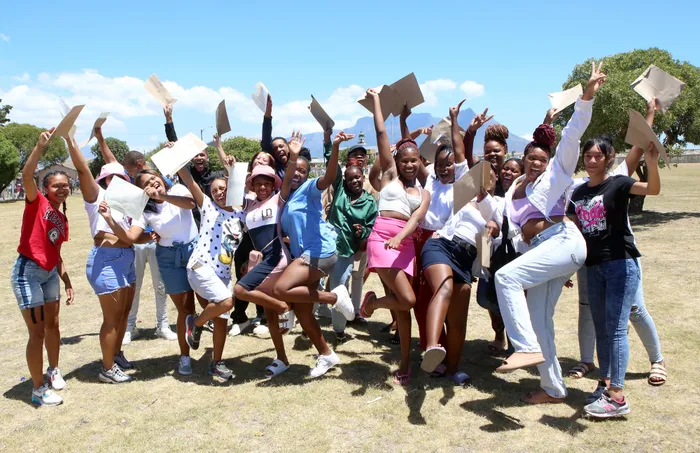Does a matric exemption help SA with skills shortages?

Picture: Brendan Magaar/African News Agency (ANA) – South Africa - Cape Town - 20 January 2023 - Heideveld Secondary 2021 Matriculants celebrate after receiving their results.
By Edwin Naidu
Amid the current euphoria of finishing matric with distinction for many, the stigma of those who scraped through with a 30 percent pass in one or two subjects remains a blight on an education system that continues to fail South Africans.
Amid the pomp, it begs whether there is any merit in celebrating an education system that makes it acceptable for you to pass even if you get 30 percent in two subjects. Many will agree that South Africa is in a mess because the bar is set so low. Accepting a 30 percent pass in two subjects remains a contested decision. To leave schools with a sense of pride and an attitude that one will take on the world, surely one should finish matric with a minimum of a 50 percent pass in all subjects.
A Bachelor’s pass opens the door to a degree course at a tertiary institution for further study for a higher certificate, diploma, or bachelor’s degree. To get this, one must pass six out of seven subjects, with at least 50 percent in four subjects, a minimum of 40 percent in a home language, and at least 30 percent in the “Language of Learning and Teaching” and at least 30 percent for one other subject. However, the caveat is that even if a student has achieved a bachelor’s pass, they do not automatically qualify for a university position.
Instead of the lower requirements for a matriculation exemption, should the schooling system only encourage excellence for some, with university entrance far more competitive than a system that continues to spew people for unemployment?
Questions persist over whether it helps the country to deal with skills shortages or even tackles the unemployment crisis. Does it take the country forward in terms of transforming the education system? In the excitement over the release of the matric exam results on Thursday, one hopes that the education authorities will revisit the 30 percent pass in two subjects en route to matric.
Suppose the percentage mark is an indicator of quality. In that case, it does not help to lower the percentage mark as it gives a false sense of what is the case, argues Professor Chika Sehoole, the Dean of the Faculty of Education at the University of Pretoria. “We need quality students if we are to have quality trainees for skills that need to go into the job market. Instead of lowering the percentage mark, we need to think about how to make meaningful and quality inputs that will assist us in improving the percentage mark rather than lowering it,” he said.
“This makes learners have low expectations in terms of their performance. Transformation should be for the better. We cannot transform the country by lowering standards.”
Basil Manuel, the executive director of the National Professional Teachers’ Organisation of South Africa, says lowering the percentage pass could be more helpful and that the solution lies in mother tongue instruction as children are transitioning to English too early. “But even more important is ensuring that all learners are accommodated in the education system.”
Labby Ramrathan, Professor at the School of Education at the University of KwaZulu-Natal and a researcher, says several skills training programmes do not require specific grade levels and can still develop appropriate skills through training. He believes that the biggest challenge is that only a few jobs are available.
Ramrathan says matriculants should look at self-employment programmes because there are few job opportunities available, and the economy is not expanding.
Self-employment may be what we need to turn this economy around. This means that our education system needs radical changes. Currently, the curriculum favours a trajectory into post-secondary education. Most learners who complete matric do not take this path, and as such, are left to the vulnerabilities of unemployment or dependency on family and the state.
Another academic, Professor Kobus Maree of the Department of Educational Psychology at the University of Pretoria, says what is evident from the annual matric story is that there is a skills shortage in the country. The economy desperately needs people qualified to contribute to maths and physical sciences. The increased numbers of black learners, in particular, achieving in those gate- way subjects can help the country transform the education system.
But it is cold comfort when you’re celebrating a matric pass that includes a 30 percent pass mark in some subjects with no hope of a decent future. The matric system needs an overhaul to ensure that children are fit for the 21st century instead of the uncertain future into which they’re dumped.
Edwin Naidu is a freelance journalist and heads up Higher Education Media Services – a social enterprise start-up involved in education in South Africa and the African Continent.